Although the myth that A.A. Milne created Winnie the Pooh to reflect different mental health conditions has been debunked. It doesn’t change the fact people can see different mental health conditions in each of the characters. Thus, I thought it’d be a nice change of pace to see, “Which Winnie The Pooh Character Are You?”.
Disclosure: This post contains affiliate links. If you click through and make a purchase, I’ll earn a commission, at no additional cost to you. Read my full disclosure here.
The Winnie The Pooh Characters
Let’s get the other classic Pooh characters and mental health conditions one’s out of the way first. Because Pooh might surprise you.
Piglet
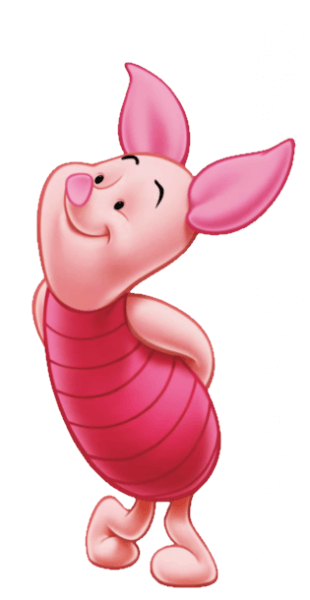
Piglet is a pretty easy one to diagnose. I don’t think there’s any doubt that Piglet suffers from generalised anxiety. With a friend like Pooh Bear and Tigger, who can blame him?
Piglet is a very timid character who always seems to be in a state of worry. Excessive worrying, even when there is no specific threat present or is disproportionate to the actual risk, is a classic sign of generalised anxiety, and a classic character trait of Piglet.
Thus, generalised anxiety pretty much sums up Piglet in a nutshell.
Tigger
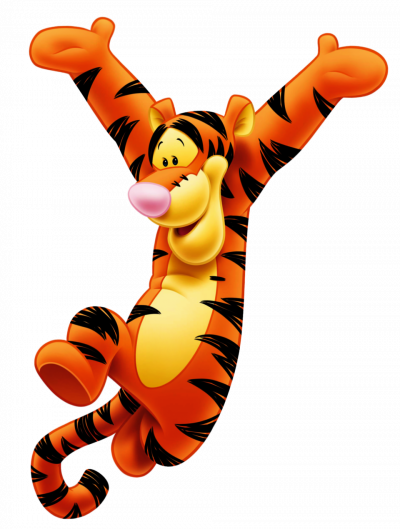
Tigger is reckless, carefree, impulsive, and full of energy almost all the time. Tigger is constantly using that energy to bounce around, because after all, “Bouncing is what Tiggers do best”.
Tigger is characterised as engaging in excessive physical movement (bouncing), doesn’t like to wait, doesn’t like to sit still, and has little to no sense of danger. He also has issues with concentrating. Thus, I think it’s pretty safe to say Tigger has ADHD.
Eeyore
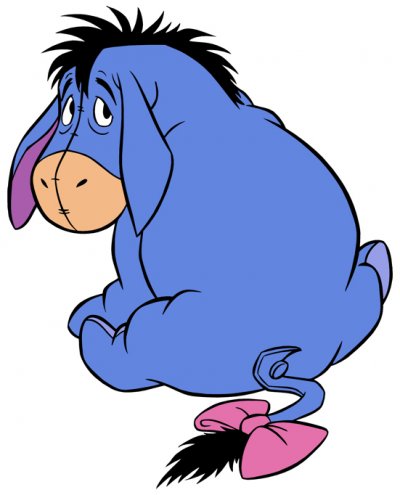
Eeyore definitely suffers from severe depression or persistent depressive disorder. Has Eeyore ever displayed any sign of being happy? He has little motivation to do anything and clearly doesn’t get joy from anything. If fact, he doesn’t seem to have any desire to do anything.
Furthermore, Eeyore is extremely withdrawn and tends to keep to himself, and it’s only the efforts made by his friends that get him to join in with them and do something.
Eeyore is the epitome of melancholy. His pessimism and gloominess I don’t think I’ve seen portrayed in any other character this well.
However, even though Eeyore is severely depressed, he’s also not suicidal, nor does he self-harm. Thus, Eeyore’s continuous depressive state isn’t one that causes an existential crisis that would lead to him wanting to end his life. I guess that pretty much is the definition of persistent depressive disorder.
Plus, if he was suicidal and/or self-harming, that would make the adventures of Pooh and his friends very different.
Owl
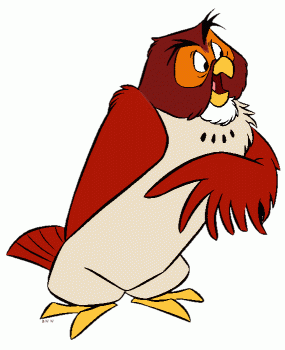
Owl comes across as a stuffy talkative character who is seen as a mentor type, most likely due to his age. Owl’s also presented as being one of, if not, the most intelligent animal in Hundred Acre Woods. It’s these characteristics that often lead to people believing he’s narcissistic.
Although Owl often rambles on in long speeches, using words others don’t understand, he might not be doing this due to narcissism. He also suffers from a tendency to be a bit of a scatterbrain.
The other animals in Hundred Acre Woods aren’t known for being very bright (except Rabbit), like Pooh, who can’t read. Much like Pooh clearly has his own learning disorder, Owl too has a learning difficulty: dyslexia.
Owl has problems with spelling, and can even have a hard time spelling his own name. However, Owl isn’t willing to admit to his difficulties, finding roundabout ways to hide them.
Owl, to me, is overcompensating for his dyslexia in order to hide it. What some might see as narcissistic behaviour with his long speeches, I believe, is actually just his coping mechanism to hide his learning difficulty from the others. This is most likely due to the shame and embarrassment of not knowing why he has these struggles. Thus, he is driven to hide it.
This is most likely due to the fact that the others look up to him as being very intelligent. Thus, struggling with undiagnosed dyslexia could be the real cause of his narcissistic seeming behaviours and attitude. Admitting that he has problems with reading and spelling would, to him, show the others that he’s not as intelligent as the others thought.
When the other animals from Hundred Acre Woods come to him for help, due to the fact they see him as being very intelligent, the fear of losing that must be quite a burden for him. Does he fear they’ll stop visiting him if they find out about his dyslexia? Most likely. Would they actually stop visiting, though? I guess we’ll never actually know unless Disney explores that as a storyline, but I doubt they would.
Rabbit
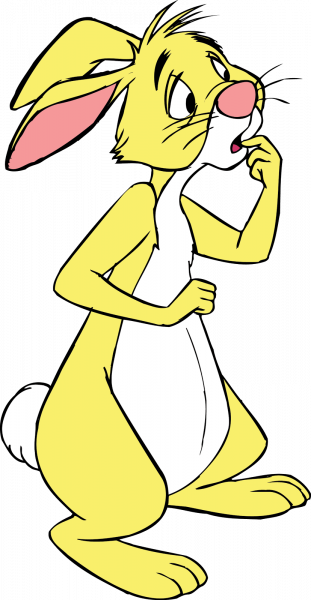
Rabbit is shown to be friendly, yet irritable. He’s also a stickler for the rules, prefers things to be orderly, and likes planning. This could explain his bossy behaviour.
Because Rabbit is often bossy, as well as believing in his own intelligence and abilities, people often label Rabbit as a narcissist. However, Rabbit is capable of being nice. Narcissists can only fake that.
Thus the question is, is Rabbit’s niceness genuine? Rabbit seems to display empathy and concern for others, so I don’t believe he’s narcissistic.
Does Rabbit have delusions of grandeur instead? That doesn’t seem likely either because Rabbit, from what I can remember, doesn’t suffer from a fear of persecution which is common for people with this condition. Nor does he seem to exhibit any other form of delusions.
It seems to me that Rabbit just has bigger-than-average self-esteem, but not one that really fits into a clinical diagnosis, and thus, a mental health condition.
One condition that might fit Rabbit, however, is OCD. If Rabbit needs him and the others to follow the rules, due to his OCD, then maybe that would explain his need to lead the group.
Rabbit’s friends are rather carefree and reckless, thus if he’s the only one who wants everyone to follow the rules in order to be safe, then he may feel that this can only be done if he’s the leader. This would explain his behaviours that others see as narcissistic as being associated with his OCD instead. This would also explain how he can also be kind and caring.
Kanga
Kanga is another interesting character that I think has been judged harshly. Kanaga, as a whole, is kind-hearted and patient and is very much the mother figure who often offers motherly advice.
Kanga can be a little overprotective of Roo, which some have interpreted as being a social anxiety disorder.
However, Kanga may be a little over-possessive of Roo, from our perspective, but an important part of mental health is understanding cultural norms and values when assessing for conditions.
Kanga and Roo are both kangaroos and as such, have very, very short pregnancies, 28-34 days in fact. Roo, like other joey’s, will spend 6-11 months in the pouch developing (depending on the species of kangaroo). At 6-11 months (depending on which species they are), joey’s will start to leave the pouch.
Thus, if Roo can still fit into Kanga’s pouch, and you often see him climbing in and out of Kanga’s pouch, then he can’t be that old and is still reliant on Kanga’s milk. This, for me, means Kanga’s behaviour isn’t over-possessive or controlling. Roo is still basically a baby. Kanga is just displaying the usual anxieties of a mother.
Roo
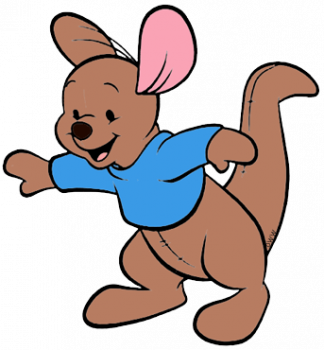
Kanga’s son, Roo, is a cheerful and energetically playful joey. However, some see Roo as being autistic because he doesn’t always pay attention to what’s going on around him. Other times he seems content with just being in Kanga’s pouch.
Again, seeing this as autism seems a little unfair once you consider the cultural norms and values of Kanga and Roo. Especially since Roo is actually still a baby. If anything, he’s probably more advanced developmentally than he should be for his age.
Christopher Robin
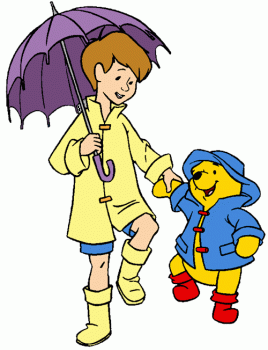
Christopher Robin, for me, isn’t suffering from a mental health condition, such as schizophrenia. The stories we all grew up on show Christopher Robin as a minor support role, who barely features in the adventures of Pooh and his friends. The fact that these adventures exist without Christopher Robin being there or knowing about them suggests to me that he’s not mentally unwell.
Pooh and his friends maintain object permanence even when the supposed observer, Christopher Robin, isn’t there. Thus, Pooh and his friends, in the context of their world, aren’t a delusion of some sort created by Christopher Robin’s mind, and thus they are real.
However, I’m basing this assumption based on the Pooh stories I saw as a child created by Disney. You might very well be able to claim that in the original stories released in the 1920s, Christopher Robin does meet the criteria for schizophrenia.
Instead, Christopher Robin fits the criteria of not just being a supporting character, but also a support worker. Christopher drops in from time to time and checks in on Pooh and his friends, rather than joining them on all their adventures. Which is far more like a support worker would do in supported housing or a nurse-type role in a hospital ward.
Pooh
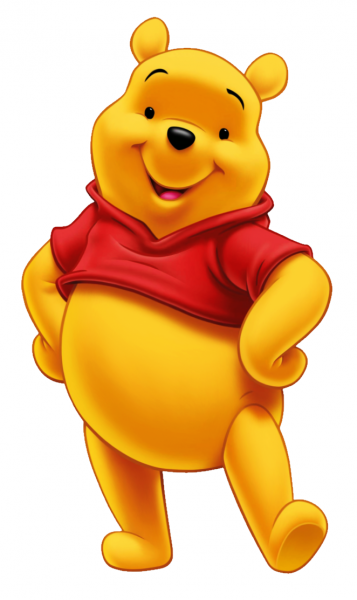
Pooh has been diagnosed with a number of different conditions for a number of different reasons over the years. For example, Pooh has been diagnosed with ADHD because of his scattered thoughts, chaotic and random lifestyle, and his forgetfulness. That could be a true interpretation of a lot of Pooh’s behaviours, and he is certainly a candidate for a bear suffering from comorbid mental health conditions. After all, a lot of people with mental health conditions suffer from more than one.
However, a lot of Pooh’s poorly thought-out plans and behaviours might stem from his childlike mind. Pooh clearly suffers from some sort of learning impairment which means he has a lower IQ than his peers.
Pooh has also been diagnosed with OCD by some, due to his fixation on honey and counting. But could the counting be a byproduct of his low intelligence? Furthermore, if Pooh has an eating disorder like some claim, that would explain his obsession with honey. Pooh clearly loves his honey after all.
But for me, rather than calling his condition an eating disorder, I personally think he suffers from addiction. Albeit an addiction to food, or in Pooh’s case, honey. He’s only interested in eating honey, which is extremely specific to an eating disorder. Plus, Pooh’s willingness to put others at risk to get honey and how he’s consumed with thoughts of honey and obtaining honey, I feel, is more akin to an addiction, like alcohol or gambling.
For example, if you know someone with substance addiction, they can have a primary substance of abuse. This primary substance of abuse is the one they can’t go without, but at the same time, they can easily use other substances of abuse in a take-it-or-leave-it kind of way. Someone addicted to heroin can take it or leave it when it comes to cannabis, alcohol, cocaine, etc. The one they can’t leave is heroin. This is why it thinks Pooh should be seen as an addict, rather than a bear with an eating disorder.
At least this would have met the definition of addiction under the DSM-IV. The DSM-V is a different story. Pooh, from what I can recall, and it’s been a long time, didn’t display signs of withdrawal. But Pooh clearly had cravings for honey.
That said, I still think Pooh suffers from honey addiction rather than suffering from an eating disorder. Due to his cravings, obsession, risk-taking, and disregard for the dangers to himself and others, he’s willing to take to obtain honey.
Have you ever met someone so obsessed with just one food item before?
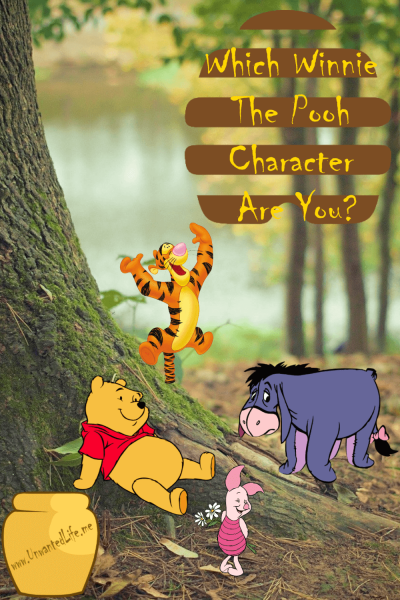
Which Pooh Character Am I?
I think I’m closest to being Eeyore. That’s because I’ve suffered from depression almost my entire life and exist in an almost permanent state of melancholy. However, I can still experience fleeting bouts of joy, unlike Eeyore. I’ve also had issues with self-harming and suicide, unlike Eeyore.
I also have a splash of Piglet in me, because I too suffer from an anxiety disorder, just not generalised anxiety. Unlike Piglet, my worries aren’t indiscriminate, my anxiety disorders have fixed fears. I suffer from social anxiety and agoraphobia (if you’re interested in finding out more about my anxiety disorders, you can do so here, here, and here).
Although in the back of my mind, I often have more of a Piglet-orientated anxiety, except I can control that.
Lastly, I obviously have a dash of Owl in me too, thanks to my dyslexia. I found lots of ways to try to hide my issues with spelling and reading. Much like how Owl talks his way out of his secret being found out, I would write my way around the words I couldn’t spell. This would make my sentences and coursework at school much longer than they needed to be, as I used a series of simpler words that could have been easily replaced by one word that I knew but couldn’t spell. It was a huge pain in the rear when doing exams.
If you’re interested in finding out more about my dyslexia, you can do so here and here.
As always, leave your feedback in the comments section below. Also, feel free to share which Winnie the Pooh character(s) you feel you are or your own take on which disorders best suit which Winnie The Pooh character in the comments section below as well. If you want to stay up-to-date with my blog, then sign up for my newsletter below. Alternatively, get push notifications for new articles by clicking the red bell icon in the bottom right corner.
Lastly, if you’d like to support my blog, then you can make a donation of any size below as well. Until next time, Unwanted Life readers.
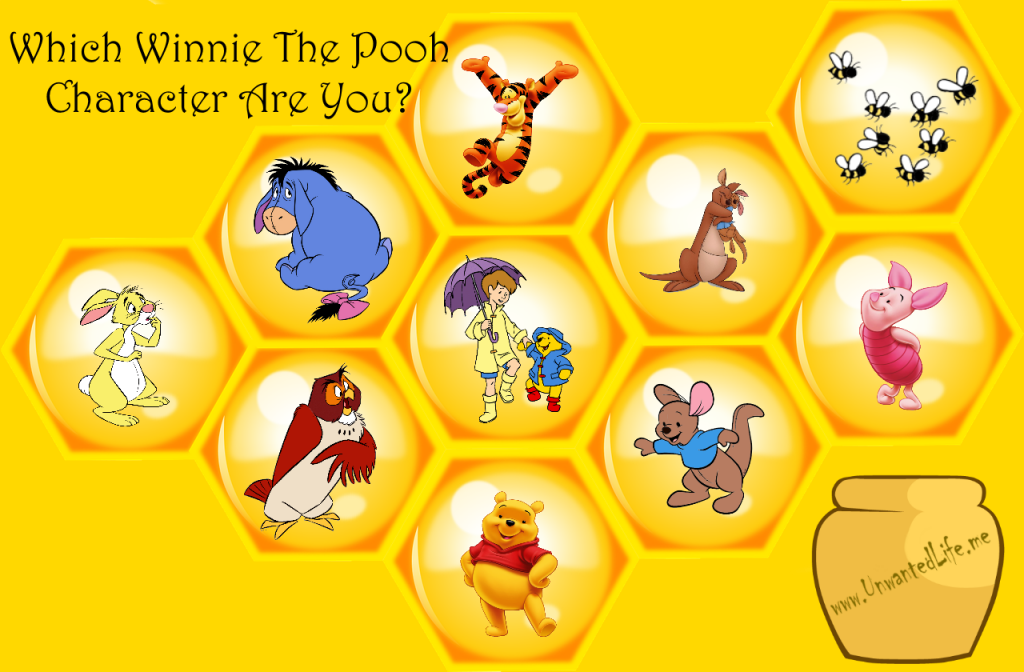

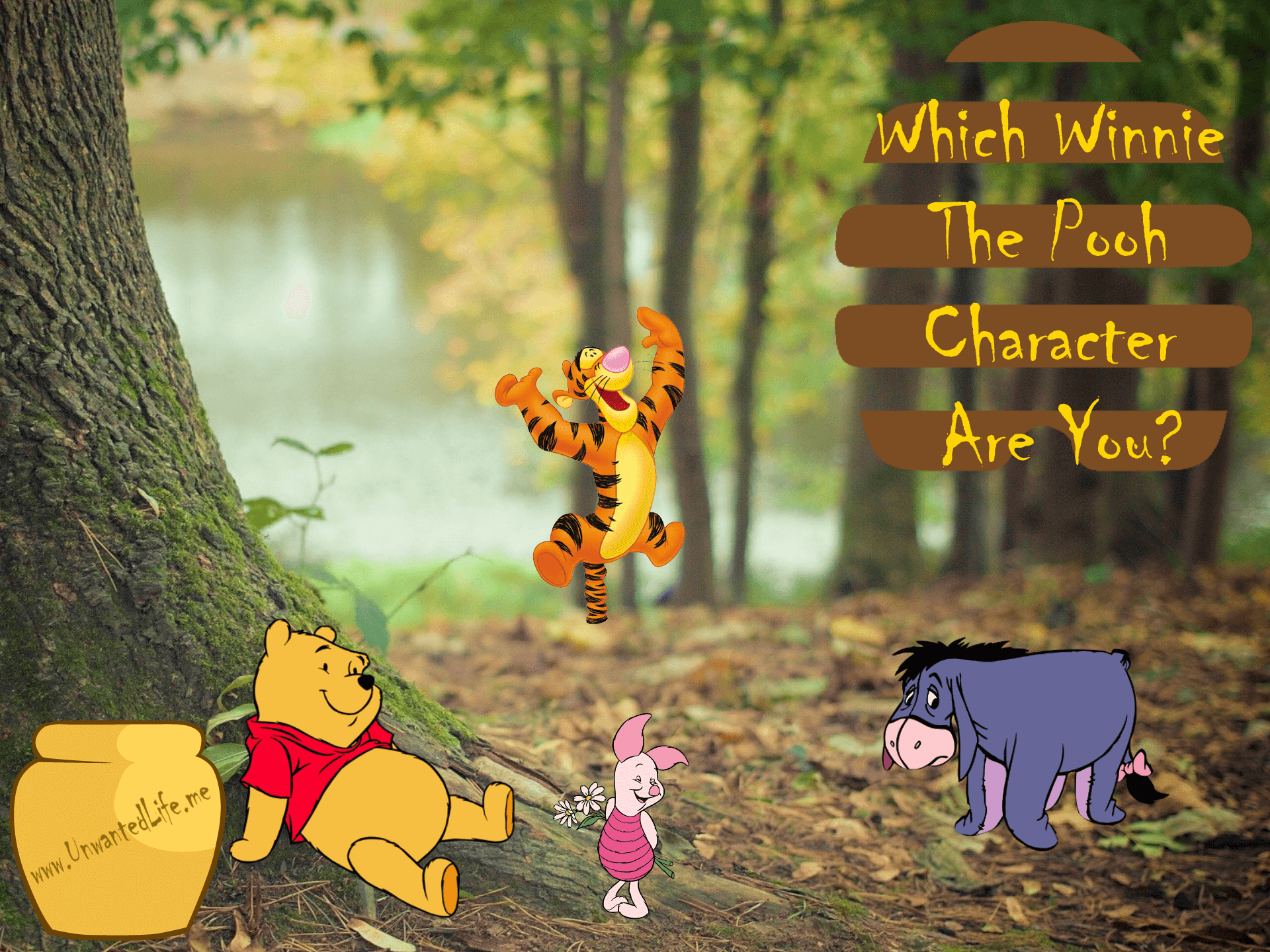
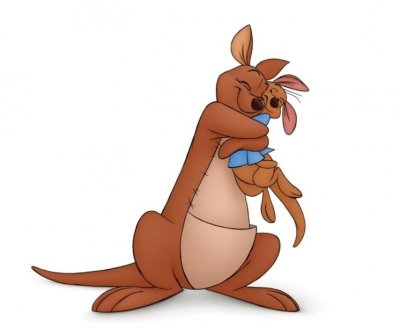
I identify with Eeyore. I’m fighting depressing and daily living is kinda complicated by lack of motivation.
I know exactly what you mean. My lack of motivation is a huge issue as well
There is a part of me that is very deeply uncomfortable with coding any characters with mental illnesses that the author didn’t code them with. It is highly unlikely that Milne would have known about any kind of mental illness except for severe depression, shell shock and possibly schizophrenia. Even then we have to remember that at the time of writing lifelong institutionalisation was the norm for any mental illness.
I always wondered if he perhaps had a severely depressed relative who was sent to an asylum and he wished that there could have been more care for them in the community when it came to Eeyore.
Before my Autism diagnosis I would have related to Eeyore – and he is the only one who I really see mental illness traits in.
However reading your article, I would say that Tigger, Rabbit, Owl and Pooh all could be showing signs of Autism.
I don’t know as much as I’d like to about Autism, given that my main focus has been addiction since about 2008.
What Autism traits are you able to recognise in Tigger, Rabbit, Owl, and Pooh?
Basically everything that you have listed as a trait of something else, could actually be down to Autism.
Interesting, I’ll have to look more into Autism then
I’m a bit like both Eeyore and Piglet. I have generalized anxiety, but I also have bipolar and the bipolar depression that makes its appearance often.
Do you have quick cycling bipolar or is it just that the depression cycles are just that hard to manage?
Trigger warning: I have bipolar 1. I take a mood stabilizer and an antidepressant that both help a lot. I tend toward depression even when I’m manic, which is weird: I was in danger of suicide attempts and self-harm when manic. I lack the energy for those things when going trough a depressive state.
I struggle to do simple things like eat when I’m in a very depressed phase.
Thankfully, my meds and Dr help has made it more manageable.
I’m glad to hear they’ve become more manageable, I can’t imagine how hard it is to have bipolar. I find it a struggle managing with suicidal and existential thoughts with just my persistent depression
I’m definitely without a doubt Piglet. I struggle with GAD, and have been trying to cope with it now a year after my diagnosis. Even though the topic is not fun, thanks for helping us think about mental health in a new way! 🙂
Thanks for taking the time to read it and comment
Some months I am Tigger and other months I am Eeyore, a right mixed bag!
Great post! It’s so well organized and easy to read; presenting each character before relating it to yourself. Plus, great pictures to complement. I think I’m a combination of Piglet, Pooh, Rabbit,and Eeyore. 🙂
Well done!
Roger
Thank you! High praise coming from someone who writes as well as you do
I’m definitely Piglet with a splash of Rabbit. Thanks for the post.
Thank you for taking the time to read it
Isn’t it funny that something you’ve never known about or given any thought to is so obvious once someone tells you about it!
I’d say I am a bit Tigger like with a side of Eeyore… Oh that could come across as a little bi-polar!
LOVE LOVE LOVE this! I hadn’t ever heard about the myth but it makes sense! I feel like everyone is a bit of all of them but it cheers me up to give a character to all of my quirks. Thanks so much!
I think a lot of people will have a bit of all of them at different times and stages in their lives
Just passing through. Might be a good blog for some people but is personally too much reading for me. Nice homepage too!
I really like this post and your detailed assessment of each character. I would say I am a combination of Eeyore and Piglet unfortunately.
Thank you, and thank you for sharing which ones you feel describes you
I really really enjoyed this post. Maybe because I was a huge Winnie the Pooh fan as I child so it brought back lovely memories of my little friends. I had a story tape that I listened to every night when I couldn’t sleep.
I don’t really know which character I would be. I have Bipolar 2, EUPD, social anxiety, and premenstrual dysphoric disorder. Neither of these sit very well together, so even when the majority of my things are controlled by antipsychotics and antidepressants, the PMDD thing can throw me completely out of whack.
Eeyore has always been my favourite character and I guess is the one I identify most with, but I definitely have some Kanga traits now I’m a mum.
For me, the most important bit of Winnie the Pooh is that the animals were all friends, irrespective of their issues/personalities and species, and I wish the world was as accepting as they are of others.
It certainly would be nice if the world was a lot more accepting and understanding
I loved this post; think it is one of my favorites so far!
I always kind of struggled to understand Winnie the Pooh, and I still do. While I love many of the stories and characters, sometimes the meanings were lost on me, even though I am told the whole book is basically the dreams of a boy lost in a fevered haze.
I love that you explore the characters of each and every person in the book, down to Roo. I think I identify most with Kanga. 🙂
I imagine patience is an important quality to have for creating poetry
Haha, I have left half poems sit for days before I think of the final lines!
This was soooooo interesting post! And I am so surprised that here are so many Piglets! Nevertheless, for me the most fits the character of Rabbit (together with depression). I think it’s a very interesting mix… a depressed rabbit 😀
Anyway, great post! I love the idea of it!
Thanks you. I imagine a lot of people can identify with rabbit at the moment
We’re having a discussion about your article. Note its 13Apr2022 and still relevant! Great work!
That’s nice to know that someone’s still talking about this article